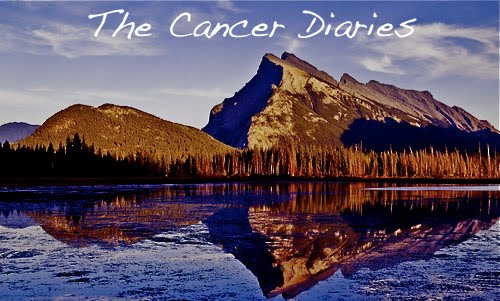So, in response, I try to gather as much information as I can. In nutrition, in side effects, in whatever way I can help to the best of my abilities. Some of the books I’m reading have confused me a little. They’re views conflict with the views of the “standard of care” medical community. While chemotherapy works by destroying cancerous cells, it also takes out the good ones as well. The views and approach that these doctors and authors take is one where you use your body’s natural defenses to battle, or at least maintain, cancer. These perspectives are on opposite sides of the spectrum, and to a patient or a family member it’s all very confusing. On one hand, you have a system that has scientific backup and research going into it. On the other, you have another system that breaks it down into the basics, using nutrition to fight your battles. What irks me is that there are claims that this business of cancer is hugely profitable, and as such, the major pharmaceutical companies have no real incentive to actively find a cure. These are the pharmaceutical companies that fund and train students in med school, our doctors of tomorrow. What they say, goes. But… could people really be that.. evil? Millions of people have died from this disease, and it would be tragic if their lives could have been considerably different if money wasn’t in the picture. Are these pharmaceutical companies really looking out for our best interests? One must remember that they are running a business… All this information is so confusing and leaves you torn on which direction you should go. Because whatever decision you make will literally be a life-or-death decision.
Currently, i'm primarily reading two books: Knockout: Interviews with Doctors Who Are Curing Cancer and How To Prevent Getting It in the First Place by Suzanne Somers, and Anti- Cancer: A New Way of Life by David Servan-Schreiber, M.D., Ph.D.
Both have been incredibly informative. I think being a patient (or a family member of a patient), you have to be willing to keep your mind open. You have to be willing to listen to what others have to say. You don't have to necessarily agree with them, but at least listen. Both of these books place an emphasis on nutrition and fighting cancer with your body instead of chemotherapy. There has been a lot of backlash with this type of approach, especially directed towards Somers, but... Is trying to live healthy, organically, and as naturally as possible really such a bad thing? Even if you do decide to choose conventional methods, I think people should pause and take a moment before knocking this p.o.v down. When you really break it down, these approaches are all about leading a healthier lifestyle. Because changing our eating habits and lifestyle (this means more exercise, less t.v.), it's not going to hurt us. You don't have to agree with the treatment plans that have been highlighted, but the basics won't hurt. Anyways, there are a couple of doctors from Mrs. Somers' book that I have become interested in. Has anyone heard or had any experiences with Dr. Stanislaw Burzynski, Dr. Nicholas Gonzalez, Dr. James Forsythe, or Chemosensitivy tests? Your input, comments, or even thoughts would be helpful to me and others that read this post!
So, to finish off. Here are some random facts that i've learned from reading so far:
- Tumeric (curcumin) is the most powerful natural anti-inflammatory agent out there. Which is good because it inhibits angiogenesis (which is the formation of blood vessels). This is important because cancerous tumors NEED these vessels to supply them with blood flow in order to survive.
- "To be assimilated by the body, turmeric must be mixed with black pepper (not simply with peppers). Ideally, it must also be dissolved in oil (olive, canola, or linseed oil preferably). In store-bought curry mixes, turmeric represents only 20% of the total. So it's better to obtain turmeric powder directly"
- Cruciform vegetables (cabbages, broccoli, cauliflower, bok choy, etc.) contain powerful anticancer molecules that are capable of detoxifying certain carcinogenic substances, promote the suicide of cancer cells, inhibit angiogenesis, etc.
- Avoid boiling cabbage and broccoli. Boiling risks destroying these powerful anticancerous molecules. Instead, cover and steam or stir-fry rapidly with olive oil.
- Tomatoes contain a substance called lycopene that leads to longer survival rates for prostate cancer patients. However, they must be cooked in order to release these nutrients. Moreover, olive oil improves their assimilation.
- Soy isoflavones block the stimulation of cancer cells by sex hormones and intervene by blocking angiogenesis. However, isoflavone supplements have been associated with an aggravation of certain breast cancers, but this is not the case for soy taken in food.
- ** The genistein in soy can interfere with Taxol. While awaiting confirmation of this interaction from human studies, it is advisable not to consume soy-based foods during chemotherapy with Taxol. Stop several days before, and start again several days after treatment**
- Green Tea contains substances that reduce the growth of the new vessels needed for tumor growth and metastases. It is also a powerful antioxidant and detoxifier. Note that black tea is fermented, a process that destroys a large portion of these anticancer substances. Oolong tea has undergone a kind of fermentation midway between green tea and black tea. Decaffeinated green tea still contains all its polyphenols (anticancer substance).
- Japanese green tea (sencha, cyokuro, match, etc.) is even richer in EGCG (another anticancer substance) than common varieties of Chinese green tea.
- Green tea must be steeped for at least 5-8 minutes - ideally ten minutes - to release these substances.
These facts noted above are just a few of the many that I learned from reading Dr. Servan-Schreiber's book. I highly recommend reading it, if not for alternative treatment purposes, then for tips on how to lead a healthier life.
However, on one note. I had discussed some of these with our oncologist and he had told me that a recent study was published where green tea had actually shown to COUNTERACT chemotherapy. I'm not sure what type of chemo, specifically, (we're going to be starting Velcade very soon, so I assume this is one that is affected by it) so I think it would be best to work with your doctor and see what he/she has to say.


Lance if your Mom's treatment is going to be Velcade...NO GREEN TEA..it interferes with the velcade. Vitamin C is also a no-no.
ReplyDeleteGentle Hugs
Carol
Southern Alberta Myeloma Patient Society Group Leader
OOPS sorry..I should have read to the end of your post!! You are a very well informed young man. See you soon.
ReplyDeleteGentle Hugs
Carol